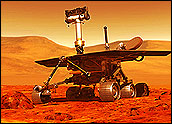
NASA’s solar-powered Mars Exploration Rover Opportunity is beginning on Thursday what controllers expect to be frequent use of an overnight “deep sleep” mode to stretch the robot’s power supply.
Opportunity has managed only one to two hours of activity on many recent days while it has been examining a stadium-sized impact crater from vantage points around the rim. Shutting down more completely overnight will conserve enough battery charge to add several hours of science operations during the day, according to Jim Erickson, Mars Exploration Rover deputy project manager at NASA’s Jet Propulsion Laboratory, Pasadena, California.
There is a calculated tradeoff — an increased risk that, without an overnight heater running, one of the six scientific instruments might be disabled by the cold. The susceptible instrument is Opportunity’s miniature thermal emission spectrometer, called the Mini-TES.
It makes infrared observations used for identifying minerals from afar to help the science team decide where to send the rover. Its observations also provide close-up evaluation of rock and soil targets, and thermal information about surface materials and the atmosphere.
Vital Insight into Minerals
“The Mini-TES gives us vital insight into the minerals in rocks and the role of liquid water in their formation, so this choice is a carefully considered decision to weigh the risk of losing this capability against the benefit of continuing and increasing Opportunity’s ability to do all the other exploration-oriented things this rover can do,” said Dr. Jim Garvin, lead scientist for Mars and lunar exploration at NASA Headquarters, Washington, D.C.
Both Opportunity and its twin rover, Spirit, have already provided several weeks of bonus operations after successfully completing their primary missions: three months of examining geological evidence about past environments at their landing sites.
Amount of Electricity Decreasing
As the Mars southern-hemisphere winter advances and dust accumulates on the solar panels, the amount of electricity the rovers can generate is decreasing. The decline is more serious for Opportunity because the robotic arm of that rover has a heater with a malfunctioning switch. The switch cannot be turned off.
A properly functioning thermostat turns the heater off during the day, but the heater stays on overnight even when it’s not needed. The amount of energy wasted was not enough to hinder Opportunity from succeeding in its primary mission, but is now sapping about one-third of the rover’s diminished amount of solar-generated electricity.
“Deep sleep gives us a way to turn that heater off overnight,” said Opportunity Mission Manager Matt Wallace of JPL. The capability to do so results from a software upgrade transmitted to both rovers in April. The first use of deep sleep, on Opportunity on May 6, verified its benefit to the useful power supply.

















































